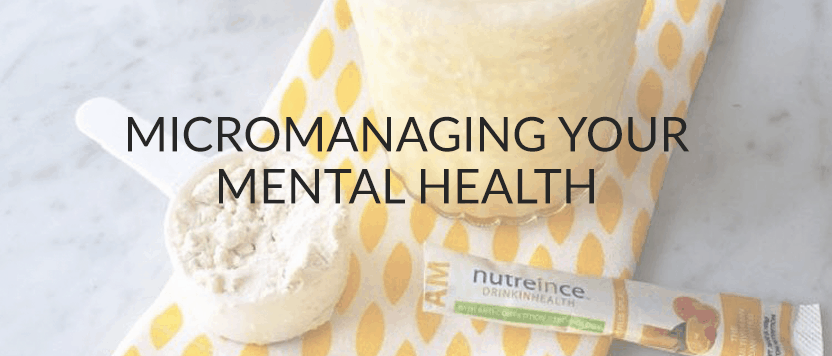Modern living can be maddening. While the 10,000 years that have passed since the agricultural revolution seem long ago, that’s a blink of an evolutionary eye. As such, our bodies and minds are still trained for hunter-gatherer life, and our responses to stress are no exception. You may be highly aware of the difference between rock climbing and handling a work crisis, but your adrenal glands- your stress-adjustment glands- are not.
Your diet, best intentions considered, may not be adequate to counter the micronutrient-sieving-effects of stress. You deserve adequate nutrition to not just function but also to feel and perform as your best self. To do that, you must avoid letting stress get the better of your metabolism. Chronic stress depletes crucial micronutrients you need to boost and balance your brain and motivate your metabolism. Our modern food supply, often grown in depleted soils and covered with fatigue-inducing chemicals, provides less nutrients, not more, than in the past.
Let’s dig into the ABCs of micronutrients (vitamins and minerals) and a few critical macronutrients (fats and protein) that you need more of when you are stressed out. What do they do for your mental health? How can you most easily get these critical nutrients from your food? When is supplementation helpful and necessary?
Don’t stress out worrying about if you have the nutrition you need. Read on to learn more about our modern-day brain-food challenge and how you can rise to meet it.
Micronutrients vs. Stress: The A-B-Cs
- Amino Acids. Protein is incredible. Your body is made, maintained, and even powered by protein when necessary. We have long known that regular protein intake is critical for mental health. For instance, protein helps to stabilize blood sugar and provides building blocks for neurotransmitters. Because neurotransmitter deficiencies can be responsible for many depressive symptoms, amino acids that are neurotransmitter-constructing amino acids like tryptophan, tyrosine, phenylalanine, and methionine are often helpful in treating depression. While it is important to eat regular protein from diverse sources, you can also supplement single amino acids to boost your resilience to physical and mental stress. A recent review article investigating nutrition support and first episode psychosis noted that the modified amino acid N-acetyl-cysteine both improved neuronal health and levels of a glutathione in the brain. 4 grams per day of the amino acid taurine has also been shown to reduce psychotic symptoms within 12 weeks.
- B Vitamins. Feeling run down? Check your B’s, which can take a nosedive quickly. Bringing the buzz, building the blood, and boosting neurotransmitter levels are just a few of their useful functions that help us deal with stress. We call them “anti-stress nutrients” because when we get stressed out, B vitamins can quickly become depleted.
- Thiamine (vitamin B1) and pantothenic acid (vitamin B5) B1 and B5 help fight off stress by maintaining proper function of the adrenal glands (the most important glands in the fight against stress).
- Vitamins B6 and B9 help equip you to better deal with the stress that you do experience by aiding in the formation of chemicals called neurotransmitters, which are necessary for balancing emotions. According to a study conducted by the Mayo Clinic and published in the Archives of Internal Medicine (now JAMA Internal Medicine), you don’t need a great deficiency in the B vitamins to set in before you really start to feel it. The study revealed that subjects who were given just half the daily requirement of vitamin B1 (thiamine) became “irritable, depressed, quarrelsome, uncooperative, and fearful that some misfortune awaited them.”
- Vitamins B6, B9 (folate), and B12 help you make neurotransmitters that keep you happy and focused! In fact, if you become deficient in thiamine or folate, you could start to feel unhappy within a day! As we age, we are more likely to become deficient in key B vitamins. For instance, a 2015 review of the nutritional status of older German adults with depression and dementia noted a high prevalence of B1, B12, and Vitamin D deficiency. Low vitamin B12 can lead to high levels of homocysteine, which can overstimulate glutamate receptors and damage brain cells. B12 further supports your mental health by helping build cell membranes, making feel-good neurotransmitters, and (with omega-3 fatty acids) increasing levels of brain-derived neurotrophic factor, which tells neurons to grow. Severe B12 deficiency symptoms can mimic dementia! Folate and B12 work together to support mental status; a small study in 2018 even showed high dose methylated folate (not folic acid) can reduce symptoms of schizophrenia. Furthermore, vitamin B6 and the amino acid tryptophan can be taken alone or complement certain medications for serotonin-related mental challenges like depression.
- Vitamin C. Your adrenal glands, helping you adapt to stress, use MOST of your vitamin C. Other amazing benefits of vitamin C, such as building your blood, making collagenous connective tissue in skin, fascia, and muscle, supporting your liver health, and boosting immunity are limited by the stress you experience. As such, your demand for vitamin C increases ten-fold during times of high stress. Because you do not store vitamin C in your body, getting more means eating or supplementing it daily. Research shows that those with better vitamin C status are generally more resilient in the face of stress: they produce less cortisol (stress hormone) and have less belly fat. Vitamin C also acts in your brain, adjusting important neurotransmitters and reducing oxidative stress, which may reduce your risk of chronic diseases like Alzheimer’s or Parkinson’s. In fact, in a large review of interventions for schizophrenia, those with first-episode psychosis were significantly deficient in vitamin D, folate, and vitamin C relative to controls. Humphry Osmond, MD, a former psychology professor at the University of Alabama, and Abram Hoffer, MD, a former psychiatrist from British Columbia, believe that weight for weight, vitamin C is “as active as Haldol,” a drug prescribed to help people deal with stress.
- Vitamin D. Low vitamin D is associated with depression as well as obesity, diabetes, cancer, thyroid disorders, and other metabolic challenges. Vitamin D plays an important role in boosting brain serotonin levels while reducing gut serotonin. Because you make vitamin D from cholesterol when you get enough direct sunlight, vitamin D is commonly taken to reduce or eliminate serotonin-linked seasonal affective disorder (aka the winter blues). It is estimated that over 96% of adults in the United States do not have adequate vitamin D levels (even with fortified foods)! Also, because the side effects of SSRIs are far worse than those of Vitamin D and omega-3 fatty acids (which are none), trying these nutrients as a first-round intervention can make safe and logical sense. Furthermore, a 2015 study found that in schizophrenics, vitamin D levels are lower and the hippocampal region of the brain with a lot of vitamin D receptors is smaller. This potentially explains the finding that patients with schizophrenia have significantly lower vitamin D than control subjects.
- Electrolytes. While you may already know that calcium and magnesium deficiencies can drive cravings for sweet and salty foods, you might not know that these minerals are important electrolytes just like sodium and potassium! When we stress out, our adrenal glands use up more sodium, our brain uses extra magnesium, and our kidneys use more potassium, calcium, and magnesium than usual. Magnesium is truly a stress-soothing superstar, supporting B vitamins, reducing migraine symptoms, mellowing muscles, and helping to reduce depressive symptoms.
- Fats. While all fats nourish a healthy brain to some extent, omega-3’s and monounsaturated fats truly steal the show. You may have heard all the buzz of the olive-oil-indulgent Mediterranean diet, which supports brain health because monounsaturated fats help to build cell membranes, where communication occurs. Omega-3s play a huge role in brain development and upkeep, especially maintaining cell membranes. For a lot more on this topic, check out our blog post on the many benefits of omega-3 fatty acids for mental health.
Turning that Frown Upside Down
FOOD – Choose good-mood-foods packed with the micronutrients discussed above.
- Amino Acids. Eat protein at every meal or snack from different sources so you get a good balance of all of the amino acids.
- B vitamins. While meats, grains, dairy, and vegetables contain B vitamins, one hidden culprit of our widespread vitamin B deficiency is likely to be our widespread deficiency in probiotics that produce them. Choose fermented foods (or take probiotics) multiple days of the week to seed your gut with the good guys!
- Vitamin C. Fermented foods also pack a punch of vitamin C, though most of us get our vitamin C from fresh fruits and vegetables. Choose raw or sprouted and soaked foods to preserve this delicate vitamin.
- Vitamin D. Eat cholesterol-rich animal foods such as eggs (and get in the sun regularly) to make your own vitamin D. Since we are often indoors, eating fatty fish, fortified dairy products, and often supplementing vitamin D may be necessary to avoid serotonin-related depression.
- Omega-3 fatty acids. Since, on average less than 18% of the plant-based omega-3 ALA is converted to the omega-3 EPA and even less to the omega-3 DHA, it can be difficult to get beneficial quantities without either eating fatty fish every day or supplementing. Algae is a plant-based source of EPA and DHA that may work well for vegans.
- Electrolytes. Try fermented foods, seafood, and sea vegetables for natural sources of sodium-containing salts. Vegetables, especially dark leafy green vegetables and mushrooms, are excellent sources of these valuable minerals.
LIFESTYLE – Eat mindfully to reduce stress and improve your assimilation of nutrients.
- Make mealtime mindful. To digest and absorb both protein and B-vitamins, you need robust stomach acid production. Most of us are too stressed or distracted to make enough stomach acid for proper digestion.
- Smell, see, and savor the experience of every bite. Go beyond just tasting your food to focusing on your food.
- Eat in a quiet place, away from distractions, whenever possible.
- Chew your food until it is easy to swallow without sipping a beverage because chewing sends signals downstream to get the rest of your gut ready for action!
- You may consider an appetizer of bitters in water or diluted apple cider vinegar to temporarily supplement your stomach acid.
- Prioritize the protein on your plate. Are you eating a meal with separate parts? Eat your protein and high salt foods first to further drive stomach acid production and encourage the rest of your gut to get on board for digestion. Next come cooked vegetables, and then raw vegetables. The easier you make it for your gut to do its job, the more nutrition you will absorb!
- Start digesting your food before it reaches your lips..
- Soups, smoothies, and blended beverages are usually easier to digest than whole foods- raw foods especially.
- Choose cooked, sprouted, soaked, fermented, or blended food to reduce the impact of anti-nutrients like phytates and oxalates. These compounds bind to and interfere with mineral absorption (like calcium or magnesium).
- Sleep well and avoid eating a few hours before bedtime. By the time you go to sleep, your liver should have digested most of your food and have access to most of the nutrients it needs from your day so it can use them. While you rest, your liver uses those nutrients to process toxins and repair tissues. If you are digesting while you should be resting and repairing, you may become less and less mentally capable of handling stress.
SUPPLEMENTS – When your diet is not, cannot, or will not be adequate, let us help you cover your bases.
- Probiotics. If fermented food isn’t a viable option or you need additional support, choose a probiotic with a balance of Bifidobacteria and Lactobacilli. Diversify the good guys so they produce B vitamins you need to be energized and happy.
- Whey Protein. A smoothie with fresh produce, a dollop of our healthy fat, a packet of our Nutreince multivitamin, and a heaping scoop of our non-denatured grass-fed whey or sprouted plant protein will help you get the amino acids you need to build neurotransmitters with greater ease while supporting more balanced blood sugar.
- B vitamins, Vitamin C, and Vitamin D. If your gut is compromised, you might not absorb these nutrients very effectively from your diet. Nutreince helps you cover your bases. Vitamin C and Vitamin D are dosed high enough to get the job done but not high enough to be dangerous. Because they work better, we give you active B vitamins like pyridoxal-5-phosphate (active B6) and L-methylfolate (active B9) to make the most of your mental micronutrition.
- Omega-3s. Don’t like seafood … or don’t like it enough to eat it most days? Try our split-dose Omega-3 supplement. EPA in the morning and DHA at night ensures you absorb as much of both fatty acids as possible. Take inflammation-quelling EPA in the morning to improve your day and brain-repairing DHA at night to boost neuron growth while you sleep!
- Electrolytes. Yes, you can take both calcium and magnesium, safely, in a multivitamin: just follow our lead and take calcium in the morning, magnesium at night. Due to less problems absorbing these minerals when you take them separately, you can take only the dose you need and supplement safely.
Whether you are bolstering your Bs, fluffing your fat intake, or maximizing magnesium, I am sure there is at least one notable nutrient above that you could get more of in your life to boost your brain health. Whether you choose food, supplements, or both to get you there, remember to slow down, eat peacefully, and let your mealtime be the most relaxing, nourishing, and brain-boosting part of your day.
Brain appetit!











